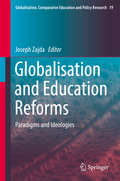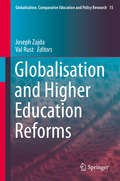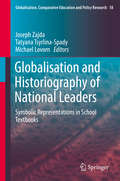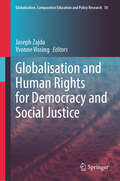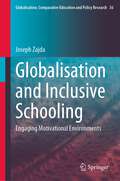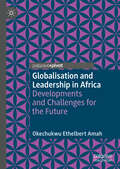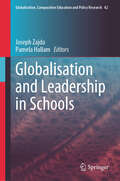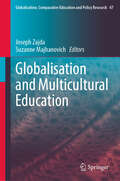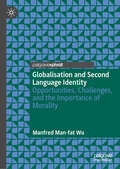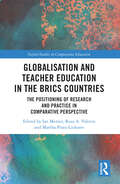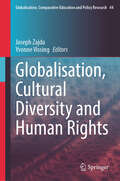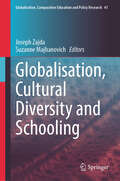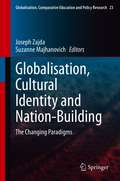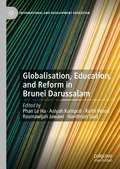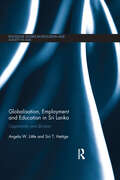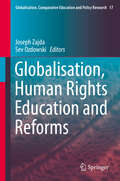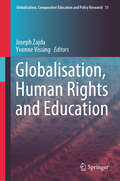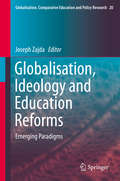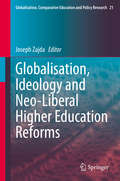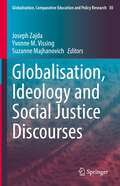- Table View
- List View
Globalisation and Education Reforms: Paradigms And Ideologies (Globalisation, Comparative Education And Policy Research Ser. #19)
by Joseph ZajdaThis book explores the interrelationship between ideology, the state, and education reforms, placing it in a global context. It examines some of the major education reforms and policy issues in a global culture, particularly in light of recent shifts in quality and standards-driven education, and policy research. The book critiques the neo-liberal ideological imperatives of current education and policy reforms, and illustrates the way the shifts in the relationship between the state and education policy affect current trends in education reforms and schooling globally. With this as its focus, the book’s individual chapters highlight hand-picked scholarly research on major discourses in the field of comparative education. A compendium of the very latest thinking on the subject, the book – like the other volumes in the series – offers a state-of-the-art sourcebook for researchers, practitioners and policymakers alike. Not only do the chapters offer a timely overview of current issues affecting comparative education and education policy research in what is now a global educational culture; they also outline future directions that education and policy reforms could take. By doing so, they provide a comprehensive picture of the intersecting and diverse discourses of globalisation and policy-driven reforms in education. Individual chapters critically assess the dominant discourses and debates on education and policy reforms. Using diverse comparative education paradigms from critical theory to historical-comparative research, they address globalisation, ideology and democracy and examine both the reasons for and outcomes of education reforms and policy change. As such, they provide an informed critique of models of quality and standards-driven education reforms that are informed by Western dominant ideologies and social values.
Globalisation and Higher Education Reforms
by Joseph Zajda Val RustThis volume explores the interrelationship between ideology, the state and higher education reforms, setting it in a global context. It examines some of the major higher education reforms and policy issues in a global culture, particularly in the light of recent shifts in quality and standards-driven education and policy research. In doing so, the book provides a comprehensive picture of the intersecting and diverse discourses of globalisation and policy-driven reforms in higher education. Representing scholarly research on major discourses in the field of higher education reforms, the book draws upon recent studies in the areas of globalisation, equality, and the role of the state in higher education reforms. It critiques the neo-liberal ideological imperatives of current higher education and policy reforms, and illustrates the way that shifts in the relationship between the state and higher education policy affect current trends in higher education reforms. Individual chapters critically assess the dominant discourses and debates on higher education and policy reforms. Using diverse comparative education paradigms from critical theory to historical-comparative research, the chapters focus on globalisation, ideology and higher education reforms and examine both the reasons and outcomes of higher education reforms and policy change. "Anyone who has been involved in higher education over the past few decades cannot fail to be affected by the impact of globalisation and neo-liberal policies on universities and society at large. In 'Globalisation and Higher Education Reforms', the 15th volume of the series 'Globalisation, Comparative Education and Policy Research', Joseph Zajda and Val Rust present chapters on education reform in the USA and in international contexts that highlight the inroads that neo-liberalism has made into policy making at higher education institutions. The chapters also illustrate the way universities have been reinventing themselves to meet the demands of a knowledge society in which corporate values of efficiency, performance and managerialism drive the agenda. What are the effects of internationalisation on higher education in the universities of today? With chapters from internationally respected scholars from around the globe, this book seeks to address the many issues of the new reality in higher education. This is a welcome, accessible volume for all those concerned with research, policy-making and curriculum development. " Professor Suzanne Majhanovich, Western University
Globalisation and Historiography of National Leaders
by Joseph Zajda Tatyana Tsyrlina-Spady Michael LovornGlobalisation and Historiography of National Leaders: Symbolic Representations in School Textbooks, the 18th book in the 24-volume book series Globalisation, Comparative Education and Policy Research, explores the interrelationship between ideology, national identity, national history and historical heroes, setting it in a global context. Based on this focus, the chapters represent hand-picked scholarly research on major discourses in the field of history textbooks and symbolic representations of national heroes, and draw upon recent studies in the areas of globalisation, history textbooks, and national leaders. A number of researchers have written on the importance of teaching national history in order to foster national identity and a sense of belonging to a certain society, state, and people among the younger generation. Some nations prefer to create national heroes out of their political leaders who are still in power, and whose lives and reputation are portrayed as being eminently spotless. Using diverse comparative education paradigms from critical theory, social semiotics, and historical-comparative research, the authors analyse the unpacking of the ideological agenda hidden behind the choice and lionization (or silencing) of the preferred national heroes. They provide an informed critique of various historical narratives depicting national leaders and national heroes. The book provides an easily accessible, practical yet scholarly source of information on international concerns in the field of globalisation, history education and policy research. Offering an essential sourcebook of ideas for researchers, history educators, practitioners and policymakers in the fields of globalisation and history education, it also provides a timely overview of current changes in politically correct history education narratives in history textbooks.
Globalisation and Human Rights for Democracy and Social Justice (Globalisation, Comparative Education and Policy Research #50)
by Joseph Zajda Yvonne VissingThis book analyses major discourses of human rights for democracy and social justice. The chapters contained in the book examine critically major issues confronting human rights for democracy and social justice both locally and globally. The chapters analyze the challenges that different societies are confronted with, as they attempt to implement, protect and defend democracy, cultural diversity and human rights in an ever-changing world, and culturally diverse environment. Topics covered include dimensional concerns for social justice and human rights and what to do about them, human rights for democracy and social justice, and celebrating cultural diversity in sport. The book will help readers to explore their own views and consider more broadly what may be in the best interests of a fair and just society, as envisioned in human rights treaties, human rights education in schools, and cultural diversity.
Globalisation and Inclusive Schooling: Engaging Motivational Environments (Globalisation, Comparative Education and Policy Research #36)
by Joseph ZajdaThis book analyses discourses of inclusive schooling and engaging motivational environments globally. It focuses on the student’s identity, belonging, performance in the classroom, and the significance of cognitive, cultural, emotional and social capital to student’s academic achievement. The book discusses and evaluates the shifts in methodological approaches to inclusive and engaging learning environments. It analyses topics such as the students’ cultural identity and achievement, motivational strategies for creating engaging learning environment, the use of constructivist pedagogy for critical thinking, social constructivism, and values education in the classroom. The book also analyses and evaluates the shifts in methodological approaches to globalisation and inclusive schooling globally, and their impact on performing schools. It contributes in a very scholarly way, to a more holistic understanding of the nexus among globalisation, comparative education research, inclusive schooling and engaging learning environments.
Globalisation and Leadership in Africa: Developments and Challenges for the Future
by Okechukwu Ethelbert AmahFocusing on both pre-colonial and post-colonial eras, this book aims to cultivate a greater understanding of globalisation processes in the context of leadership behaviour in Africa. Analysing empirical evidence and theoretical frameworks, the author evaluates the role of leaders in the failure of African globalisation and seeks to propose an initiative for change. As emphasis shifts from world control to regional and sub-regional control, the new face of globalisation offers an opportunity for Africa to grow and develop with a new leadership perspective. Presenting servant leadership as a solution to Africa’s global failures, this timely book explores the challenges of governance, resource management and regionalisation, and will be of value to anyone interested in the development of Africa as a continent.
Globalisation and Leadership in Schools (Globalisation, Comparative Education and Policy Research #42)
by Joseph Zajda Pamela HallamThis book analyses dominant discourses of globalisation and leadership in schools. The chapters in this volume advance further the discussions of the nexus between globalisation and leadership in schools. The politics of education reforms, governance and school leadership in the 21st century reflect a new emerging paradigm of standards-driven and outcomes-defined educational policy change. This ethos of academic performance has affected the nature and the role of school leadership in the 21st century, and emerging educational challenges and strategies. Academic achievement, standards, and educational results overall, depend on the nature and quality of school leadership, teachers and school’s culture. Another emerging change affecting school leadership is autonomy in schools in designing curricula and managing resources, where the role of the school leader has grown far beyond that of administrator. School autonomy has also affected the changing role of school leadership. The other key role of effective leadership is the focus on diagnosing the school’s needs, and supporting, evaluating and developing teacher quality. Developing school leaders in the 21st century requires clearly defining their key leadership roles and responsibilities for leading and inspiring teachers to achieve high academic standards, and the quality of the curriculum, and acknowledging, and accepting their significant role in improving school‘s image, as a standards-driven and academically performing institution.The book contributes in a very scholarly way, to a more holistic understanding of the nexus between globalisation, and dominant discourses of leadership in schools.
Globalisation and Multicultural Education (Globalisation, Comparative Education and Policy Research #47)
by Joseph Zajda Suzanne MajhanovichThis book analyses dominant discourses of globalisation, multiculturalism and schooling. The chapters advance further the discussions on globalisation and its impact on cultural diversity and multiculturalism in a globalised world. Multicultural education, as presented in this volume, is seen in a broad context. It includes factors such as race, ethnicity, gender, socio-economic status, culture, age, and physical ability, as well as a variety of beliefs and values. Zajda has argued that globalisation represents a synthesis of technology, ideology, and organisation, specifically related to border crossings of people, global finance, trade, IT convergence, as well as cross-cultural communication. The reality of multiculturalism has been brought into stronger focus because of globalisation. Multiculturalism is more evident today because of globalisation. The book contributes in a very scholarly way, to a more holistic understanding of the nexus between globalisation and dominant models of multicultural education, and their impact on students’ engagement, and academic achievement.
Globalisation and National Identity in History Textbooks
by Joseph ZajdaGlobalisation and National Identity in History Textbooks: The Russian Federation, the 16th book in the 24-volume book series Globalisation, Comparative Education and Policy Research, discusses trends in dominant discourses of identity politics, and nation-building in school history textbooks in the Russian Federation (RF). The book addresses one of the most profound examples of the re-writing of history following a geo-political change. Various book chapters examine debates pertaining to national identity, patriotism, and the nation-building process. The book discusses the way in which a new sense of patriotism and nationalism is documented in prescribed Russian history textbooks, and in the Russian media debate on history textbooks. It explores the ambivalent and problematic relationship between the state, globalisation and the construction of cultural identity in prescribed school history textbooks. By focusing on ideology, identity politics, and nation-building, the book examines history teachers' responses to the content of history textbooks and how teachers depict key moments in modern Russian history. This book, an essential sourcebook of ideas for researchers, practitioners and policymakers in the fields of globalisation and history education, provides timely information on history teachers' attitudes towards historical knowledge and historical understanding in prescribed Russian history textbooks.
Globalisation and Second Language Identity: Opportunities, Challenges, and the Importance of Morality
by Manfred Man-fat WuThis book focuses on how globalisation influences and affects second language (L2) identity, including both benefits and caveats of globalisation. The author takes a philosophical perspective to the topic, drawing on the theoretical foundations of Kant and Hegel to explore positive and negative impacts of issues related to globalisation such as human rights and identity reconstruction, and argues that morality should be considered as a key component in fostering L2 identity. Since L2 autonomy - the capacity to control the psychological and socio-cultural dimensions related to L2 learning (Benson, 2001) - is an integral part of L2 identity and contributes to successful language learning, the author considers how to reconceptualise and foster L2 autonomy in the age of globalisation. He finds that globalisation has created new challenges and demands for L2 teachers, and explores how far they must transform their identity for effective teaching, including recommendations for the future. This book will be of particular interest to students, teachers and academics in fields including applied linguistics, language education, language teacher training, psycholinguistics, and sociolinguistics, as well as scholars of sociology and philosophy.
Globalisation and Teacher Education in the BRICS Countries: The Positioning of Research and Practice in Comparative Perspective (Oxford Studies in Comparative Education)
by Ian Menter, Roza A. Valeeva and Martha Prata-LinharesThis edited volume critically engages with the debate on teacher education systems in the BRICS countries (Brazil, Russia, India, China, and South Africa), considering the effects of contemporary globalisation processes on each differing geographic location.Written by leading researchers from the BRICS countries, chapters reveal the processes present in these countries regarding the often-problematic relationships between research, policy, and practice, as well as the extent of integration between higher education institutions and basic schools, with particular emphasis on teachers’ professional development. With a particular focus on the role of research and positioning of the school practicum, the book offers new insights into the processes of educational globalisation. It presents comparative discussions of the development of BRICS and the significance of education and preparation of teachers between the five nations, each with differing educational traditions.Ultimately, this book provides a unique picture of teacher education systems across these five countries and offers new perspectives that will enrich the work of scholars, students, and researchers in the fields of international and comparative education, education policy and politics, globalisation, and teacher education. Policymakers and teacher educators involved in globalisation studies may also benefit from the volume more broadly.
Globalisation, Cultural Diversity and Human Rights (Globalisation, Comparative Education and Policy Research #44)
by Joseph Zajda Yvonne VissingThis book analyses major discourses of cultural diversity and human rights. The chapters contained in this book examine critically major issues confronting cultural diversity and human rights, both locally and globally. They analyze the challenges that different societies are confronted with, as they attempt to implement, protect and defend cultural diversity and human rights in an ever-changing world, and culturally diverse environment. Topics covered include celebrating cultural diversity in sport, human rights legacies of the African slave trade and the long-term implications of colonialism, assessment of human rights and sports, effectiveness in intercultural dialogue in dominant discourses of cultural diversity and human rights, and the rising importance of cultural diversity and human rights in sport for children and youth.This book will be helpful to readers to explore their own views and consider more broadly what may be in the best interests of a fair and just society, as envisioned in human rights treaties, human rights education in schools, and cultural diversity.
Globalisation, Cultural Diversity and Schooling (Globalisation, Comparative Education and Policy Research #41)
by Joseph Zajda Suzanne MajhanovichThis book analyses dominant discourses of globalisation, cultural diversity and schooling. The collection in this volume advance further the discussions on the phenomenon of globalisation, and its far-reaching effects on our world, and consider cultural diversity in its broadest sense, as it manifests itself in a globalised world. Zajda has argued that globalisation represents a synthesis of technology, ideology and organisation, specifically related to border crossings of people, global finance and trade, IT convergence as well as cross-cultural communication. The reality of cultural diversity has been brought into stronger focus because of globalisation. Cultural diversity, always present in society is more evident today because of globalisation. The ways society copes with cultural diversity have changed such that the embrace of cultural diversity as part of identity is encouraged in liberal democracies. Cultural diversity, as presented in this volume is seen in a broad contextand includes factors such as race, ethnicity, gender, sexual orientations, socio-economic status, culture, age, and physical ability as well as a variety of beliefs and values. The book contributes in a very scholarly way, to a more holistic understanding of the nexus between globalisation, cultural diversity, democracy, and equality for all.
Globalisation, Cultural Identity and Nation-Building: The Changing Paradigms (Globalisation, Comparative Education and Policy Research #23)
by Joseph Zajda Suzanne MajhanovichThis book critiques dominant discourses and debates pertaining to cultural identity, set against the current backdrop of growing social stratification and unequal access to quality education. It addresses current discourses concerning globalisation, ideologies and the state, as well as approaches to constructing national, ethnic and religious identities in the global culture. It explores the ambivalent and problematic connections between the state, globalisation, the construction of cultural identity, and the nation-building process – also in connection with history education and the history textbooks used in schools. The book also explores conceptual frameworks and methodological approaches applicable to research on the state, globalisation, nation-building and identity politics. Drawing on diverse paradigms, ranging from critical theory to globalisation, the book, by focusing on globalisation, ideology and cultural identity, critically examines recent research in history education and its impact of identity politics, as well as the most significant dimensions defining and contextualising the processes surrounding nation-building and identity politics globally. Given the need for a multiple perspective approach, the authors, who have diverse backgrounds and hail from different countries and regions, offer a wealth of insights, contributing to a more holistic understanding of the nexus between the nation-state and national identity.
Globalisation, Education, and Reform in Brunei Darussalam (International and Development Education)
by Le Ha Phan Keith Wood Asiyah Kumpoh Rosmawijah Jawawi Hardimah SaidThis book focuses on the intertwined relationships between globalisation, nation-building, education, and reform as manifested throughout the modern history of Brunei Darussalam, an Islamic monarchy located on the island of Borneo in Southeast Asia. It is the first book dedicated to the examination of Brunei’s education system, schooling, teacher education, and society in close connection with the national philosophy Melayu Islam Beraja (MIB) or Malay Islamic Monarchy. The authors provide a historical understanding of the country’s education and tell Brunei’s story of educational reform and change in its own language, narratives, accounts, and unique standpoints. Interdisciplinary chapters draw on significant historical and textual sources in three languages, namely Arabic, English, and Malay, to contribute to scholarship on education studies, international and comparative education, and international and development education.
Globalisation, Employment and Education in Sri Lanka: Opportunity and Division (Routledge Studies in Education and Society in Asia)
by Angela W. Little Siri T. HettigeSince the late 1970s, Sri Lanka has undergone a socio-economic transformation, from protectionism towards economic liberalisation and increasing integration into the world economy. Through a systematic comparison of these periods of economic change (1956–1977, and 1977 to the present), Angela W. Little and Siri T. Hettige examine the impact of this transformation on education, youth employment and equality of opportunity in Sri Lanka. The book charts Sri Lanka’s shift from a predominantly agricultural economy to one dominated by services and manufacturing, a reduction in unemployment, rising educational and occupational levels, expectations and achievements, and a reduction in poverty. In turn, it reveals a growing role for the private sector and foreign interests in post-secondary education and a modest growth in private education at the primary and secondary levels, as well as widening social disparities in access to qualifications, training and skills. The Sri Lankan experience of, and engagement with, globalisation has been tempered by a long-running ethnic conflict that hindered economic and social development and diverted considerable public funds into defence and war. Now that the war is ‘won’, the challenge is how to invest in human resource development and the fulfilment of the expectations of youth from all ethnic and social groups. This challenge requires serious policy analysis, the generation of more state revenues, the reallocation of existing public resources, and a political commitment to the winning of a sustainable peace and stability. This book makes an important contribution to the broader international literature on the implications of globalisation for education policy and practice, and to the interaction of exogenous and endogenous forces for educational change. It deals with the tension between the high social demand for education and the growing demand for specialised skills in a changing economy. As such, it has a wide interdisciplinary appeal across education policy and politics, Asian education, South Asian society, youth policy, sociology of education, political economy of social change, and globalisation.
Globalisation, Human Rights Education and Reforms
by Joseph Zajda Sev OzdowskiThis book, the seventeenth instalment in the 24-volume series Globalisation, Comparative Education and Policy Research, explores the interrelationship between ideology, the state and human rights education reforms, setting it in a global context. The book examines major human rights education reforms and policy issues in a global culture. It focuses on the ambivalent and problematic relationship between the state, globalisation and human rights education discourses. Using a number of diverse paradigms, ranging from critical theory to historical-comparative research, the authors examine the reasons for, and the outcomes of human rights education reforms and policy. The authors discuss discourses surrounding the major dimensions affecting the human rights education, namely national identity, democracy, and ideology. These dimensions are among the most critical and significant dimensions defining and contextualising the processes surrounding the nation-building, identity politics and human rights education globally. With this as its focus, the chapters represent hand-picked scholarly research on major discourses in the field of human rights education reforms. The book draws upon recent studies in the areas of globalisation, equality, and the role of the state in human rights education reforms. Furthermore, the perception of globalisation as dynamic and multi-faceted processes clearly necessitates a multiple-perspective approach in the study of human rights education. This book provides that perspective commendably. It also critiques current human rights education practices and policy reforms. It illustrates the way shifts in the relationship between the state and human rights education policy. In the book, the authors, who come from diverse backgrounds and regions, attempt insightfully to provide a worldview of current developments in research concerning human rights education, and citizenship education globally. The book contributes, in a very scholarly way, to a more holistic understanding of the nexus between nation-state, human rights education both locally and globally.
Globalisation, Human Rights and Education (Globalisation, Comparative Education and Policy Research #51)
by Joseph Zajda Yvonne VissingThis book analyses major discourses of human rights and education. It examines critically major issues confronting human rights and education, both locally and globally. The various chapters analyze the challenges that different societies are faced with, as they attempt to implement, protect and defend democracy, cultural diversity and human rights in schools. The book helps readers to explore their own views and consider more broadly what may be in the best interests of a fair and just society, as envisioned in human rights treaties, human rights education in schools, and cultural diversity.
Globalisation, Human Rights, Sports, and Culture (Globalisation, Comparative Education and Policy Research #37)
by Joseph Zajda Yvonne VissingThis book offers research findings of the different types of human rights issues that concern athletes and sports programs and the issue of how organizations are addressing safety and human rights issues. The study of sports has not typically been considered as a human rights field. In recent years it is clear that athletes have experienced a variety of human rights violations. As a result, many sports programs have been confronted with criminal violations of abuse and maltreatment. Some sports organizations are developing athlete bills of rights in response. The book provides readers with an overview of the importance of human rights policies and practices in sports, and a synthesis of where the field of sport human rights could be developed. The chapters explores human rights in sports from both organizational and interpersonal approaches. There are both organizational and individual factors associated with human rights. There can be rights violations by coaches, trainers, doctors, or even other athletes. Violations can be physical, sexual, emotional, social, or financial. Organizational policies vary from being very equitable and rights-respecting to those that put athletes at risk or discriminate against them. This book is the first of its kind that links together sports and human rights in a systematic way.
Globalisation, Ideology and Education Policy Reforms
by Joseph ZajdaThe eleventh in the 12-volume book series Globalisation, Comparative Education and Policy Research, this work sets out to explore the interrelationship between ideology and education reforms, setting it in a global context. With this as its focus, the chapters represent hand-picked scholarly research on major discourses in the field of comparative education. A compendium of the very latest thinking on the subject, this volume is, like the others in the series, a state-of-the-art sourcebook for researchers, practitioners and policymakers alike. Not only do the chapters offer a timely overview of current issues affecting comparative education and education policy research in what is now a global educational culture, but the work also contains ideas about future directions that policy reforms could take. The book draws upon recent studies in the areas of globalisation, equity, and the role of the State. It explores conceptual frameworks and methodological approaches applicable in the research covering the State, globalisation, and education reforms. The research evinces the neo-liberal ideological imperatives of current education and policy reforms, and illustrates the way that shifts in the relationship between the State and education policy affect current trends in education reforms and schooling globally. Individual chapters critically assess the dominant discourses and debates on comparative education research in education and policy reforms. Using diverse comparative education paradigms from critical theory to globalisation, the authors focus on globalisation, ideology and democracy and examine both the reasons and outcomes of education reforms, policy change and transformation. They provide a more informed critique of models of accountability, quality and school effectiveness that are informed by Western social values. The book also draws upon recent studies in the areas of equity, cultural capital and dominant ideologies in education.
Globalisation, Ideology and Education Reforms: Emerging Paradigms (Globalisation, Comparative Education and Policy Research #20)
by Joseph ZajdaThis book analyses the nexus between ideology, the state, and education reforms worldwide. The research evinces the neo-liberal ideological imperatives of current education and policy reforms and illustrates the way these shifts in the relationship between the state and education policy are affecting current trends in education reforms and schooling around the globe. With this as its focus, the chapters represent hand-picked scholarly research on major discourses in the field of global education reforms. Offering a compendium of the very latest thought on the subject, this book is, like the others in the series, a state-of-the-art sourcebook for researchers, practitioners and policymakers alike. Not only do the chapters offer a timely analysis of current issues shaping education policy research; the work also contains ideas about future directions that education and policy reforms could take. By doing so, it provides a comprehensive view of the diverse and intersecting discourses on globalisation and policy-driven reforms in education.The book draws on recent studies in the areas of globalisation, education reforms, and the role of the state. Respective chapters critically assess the dominant discourses and debates on education and policy reforms. Using diverse comparative education paradigms, ranging from critical theory to historical-comparative research, they focus on globalisation, ideology and democracy, and examine both the reasons for and outcomes of education reforms and policy change.
Globalisation, Ideology and Neo-Liberal Higher Education Reforms (Globalisation, Comparative Education and Policy Research #21)
by Joseph ZajdaThis book sets out to examine the neo-liberal dimensions of globalisation and market-driven economic imperatives that have impacted higher education reforms. It critiques the notions of accountability, efficiency, academic capitalism, quality of education, and the market-oriented and entrepreneurial university model, based on a neo-liberal ideology. The expansion of economic rationality into the educational sector is one the most ubiquitous dimensions of neo-liberalism and one of its most powerful ideological tools, resulting in the commodification, commercialization, and marketization of education and knowledge. The book critiques structural changes in education and the impact of neo-liberalism and globalisation on educational systems around the world. With this as its overall focus, the respective chapters present hand-picked scholarly research on major discourses in the field of global neo-liberal education reforms. The book draws upon recent studies in the areas of globalisation, neo-liberal education reforms, and the role of the state. It critically assesses the neo-liberal ideological imperatives of current education and policy reforms and illustrates how these shifts in the relationship between the state and education policy are shaping current trends in education policy reform outcomes. Taken together, the chapters offer a timely analysis of current issues affecting neo-liberal education policy research, and outline future directions that education and policy reforms could take.
Globalisation, Ideology and Politics of Education Reforms
by Joseph ZajdaThis 14th volume in the 24-volume book series sets out to explore the interrelationship between ideology, the state, and education reforms, placing it in a global context. It examines some of the major education reforms and policy issues in a global culture, particularly in the light of recent shifts in accountability, quality and standards-driven education, and policy research. By doing so, it provides a comprehensive picture of the intersecting and diverse discourses of globalisation and policy-driven reforms in education. The book draws upon recent studies in the areas of globalisation, equality, and the role of the state. It explores conceptual frameworks and methodological approaches applicable in the research covering the state, globalisation, and education reforms. It critiques the neo-liberal ideological imperatives of current education and policy reforms, and illustrates the way that shifts in the relationship between the state and education policy affect current trends in education reforms and schooling globally. Individual chapters critically assess the dominant discourses and debates on education and policy reforms. Using diverse comparative education paradigms from critical theory to historical-comparative research, the chapters focus on globalisation, ideology and democracy and examine both the reasons and outcomes of education reforms and policy change. They provide an informed critique of models of accountability, quality and standards-driven education reforms that are informed by Western dominant ideologies and social values. The book also draws upon recent studies in the areas of equity, cultural capital and dominant ideologies in education.
Globalisation, Ideology and Social Justice Discourses (Globalisation, Comparative Education and Policy Research #30)
by Joseph Zajda Suzanne Majhanovich Yvonne M. VissingThis book examines dominant discourses in social justice education globally. It presents cutting-edge research on the major global trends in education, social justice and policy research. Using diverse paradigms, ranging from critical theory to discourse analysis, the book examines major social justice and equity education reforms and policy issues in a global culture, with a focus on the ambivalent and problematic relationship between social justice education discourses, ideology and the state. The book discusses democracy, ideology and social justice, which are among the most critical and significant factors defining and contextualising the processes surrounding social justice education reforms globally. It critiques current social justice education practices and policy reforms, illustrating the shifts in the relationship between the state, ideology, and social justice education policy.Written by authors from diverse backgrounds and regions, this book examines current developments in research concerning social justice education. It enables readers to gain a more holistic understanding of the nexus between social justice education, and dominant ideologies, both locally and globally. It also provides an easily accessible, practical, yet scholarly insights into local and global trends in the field of social justice education. Discourses of Globalization, Ideology and Social Justice, with contributions from key scholars worldwide, should be required reading for a broad spectrum of users, including policy-makers, academics, graduate students, education policy researchers, administrators, and practitioners.
Globalisation, Nation-Building and History Education (Globalisation, Comparative Education and Policy Research #40)
by Joseph Zajda John WhitehouseThis book uses historiography and discourse analysis to provide a new insight into understanding the nexus between ideologies, the state, and nation-building—as depicted in history school textbooks. It focuses on the interpretation of social and political change, significant events, and examining possible new biases and omissions in school textbooks. The ‘Europeanization’ of history textbooks in the EU is an example of western-dominated Grand Narrative of pluralist democracy, multiculturalism, and human rights, according to the canon of a particularly European dimension. Various public debates in the USA, China, the Russian Federation (RF), Japan, and elsewhere, dealing with understandings of a nation-building, national identity, and history education point out to parallels between the political significance of school history and the history education debates globally.The book demonstrates that the issue of national identity and balanced representations of the past continue to dominate the debate surrounding the goals, dominant ideologies and content of history textbooks, and historical narratives. It concludes that competing discourses and ideologies will continue to define and shape the nature and significance of historical knowledge, ideologies and the direction of values education in history textbooks. This book provides an easily accessible, practical, yet scholarly insights into local and global trends in the field of history education, and should be required reading for a broad spectrum of users, including policy-makers, academics, graduate students, education policy researchers, administrators, and practitioners.
